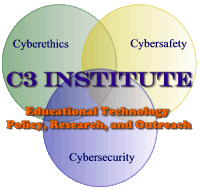

![]()
![]()
![]()
![]()
![]()
![]()
![]()
![]()
![]()
 April
is Cyberawareness Month!
April
is Cyberawareness Month!
October is Cybersecurity
Awareness Month!
Setting your clocks forward or back for Daylight Saving Time and replacing the batteries in smoke detectors are rituals repeated every spring and fall. Similarly, April and October are good times to remind ourselves about Cyberawareness issues. April is Cyber Awareness Month! is a great time to help educators, students and parents learn more about Cyberawareness issues.October is National Cyber Security Awareness Month! is a collective effort among the Multi-State Information Sharing and Analysis Center, the National Cyber Security Division and the National Cyber Security Alliance to raise cyber security awareness nationwide and empower citizens, businesses, government and schools to improve their cyber security preparedness and help promote a safe Internet experience.
With the onslaught of new online threats such as identity
theft and spyware, engaging in safe online behavior is crucial. We use
computers in virtually every aspects of our lives and we must understand
the risks, along with the steps we can take to help protect ourselves
and our information online. 
While colleges, universities, organizations and businesses across the country plan security education and awareness events to help promote Cyber Security Awareness, Educational Technology Outreach continues to plan a month’s worth of activities twice a year (April and October) to help promote the K-20 community’s awareness of cyber related issues and encourage safe online practices. Both an interactive calendar and a printable version are available. You can also print out Student Recognition forms for your class.
Visit the NCSA interactive calendar to see other events taking place. Also visit our Cyberawareness Blog or take part in our educator Cyberawareness survey.
This calendar format lists Cyber-awareness activities and resources that can help educators and their students celebrate Cyber-awareness Month in April and Cyber Security Awareness Month in October. ETO would like to hear about the great things you do during April and October to promote Cyber-awareness. Schools’ participation may be showcased at the ETO website and the C3 Conference.
READ
MORE to learn more about the History of Cyber Awareness
and Cyber Security Awareness Initiatives [More]
Past & Future Calendars |
||
| October 2008 | October 2007 | April 2007 |
| October 2006 | April 2006 | October 2005 |
| April 2005 | October 2004 | April 2004 |
Department
of Homeland Security and NCSA’s 2006 Emerging Internet Threat
List:
Helping Consumers Prepare to Avoid Potential Threats
Released February 15, 2006
| Copyright © 2007 Educational Technology Policy, Reserach, and Oureach, Inc. http://www.edtechpolicy.org dpruitt@umd.edu |
 |
 April is Cyberawareness Month!
April is Cyberawareness Month!